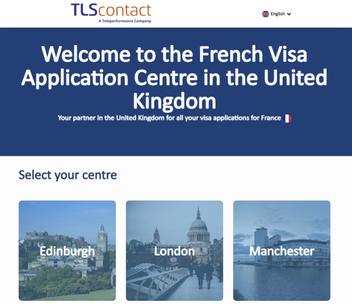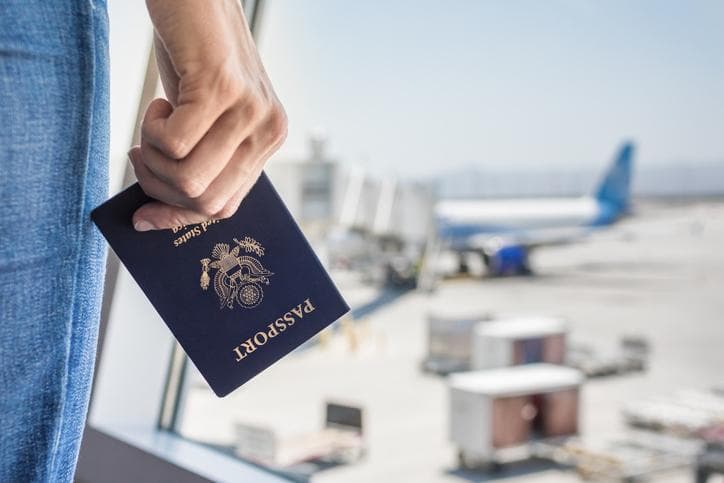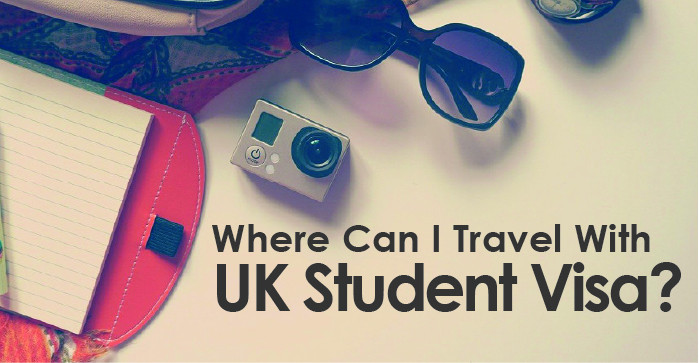- 020 4538 5124
- Meet the Team

Can I Travel to Paris With a UK Student Visa

Paris is a beautiful city in northern France and easily accessible from London by air from one of London’s airports, by train via the Eurostar from St Pancras International, and by road on the Eurotunnel near Folkestone. So while you’re in the UK with a valid visa, it may be tempting to travel across the channel and for a few days in the City of Lights (and Love).
But since the UK is no longer in the EU and has never been part of the Schengen Area, you need to show your passport at border control when travelling, by whichever means, to mainland Europe. So if you want to travel to Paris, you’ll need the necessary visa, unless your passport or residence permit is issued by another EU country, the UK, the US or Canada, although there are limitations on how long you can stay.
So before you book your trip to Paris, make sure you know what restrictions are in place for your nationality.
Your Rights as a Student Visa Holder in the UK

When you arrive in the UK after successfully obtaining your Student visa , you should pick up your biometric residence permit (BRP) from a Post Office branch or from your sponsor at your educational institute . Your BRP will include details of your visa, including how long you’re permitted to stay in the UK and how many hours you’re permitted to work.
Students studying below degree level may work up to 10 hours per week during term time , while those studying at degree level or above may work up to 20 hours a week during term time. Outside of term time, in official course holidays, all international students may work full-time . If you work more than your permitted number of hours , you’re putting your visa-holder status at risk.
When you apply for jobs, you must show your employer your residence permit so they can ensure you have the right to work in the UK and don’t employ you for more hours than you’re permitted. As an international student, you can only take on fixed-term contracts, so you have an end date for your employment. You must also not be self-employed or run a business.
International students also may not work as:
- Professional sportspeople, including sports coaches
- Entertainers, including actors, musicians, dancers and performers, unless they are university students of dance, drama and music on work placements.
- Doctors or dentists in training
The relevant taxes will automatically be drawn from the student’s payslips. International students may also use the NHS, as they will have paid the immigration health surcharge when applying for their visa. Your visa may be refused if you don’t pay the relevant fees, or show sufficient finances , however, you should have the right to appeal, elongating the visa processing time .
Travelling on a Student Visa

International students also have the right to travel whilst they are Student visa holders in the UK. However, a Student visa is only a temporary residency permit, not a permanent residency permit, also known as settled status or indefinite leave to remain (ILR), so this does not grant international students the same travelling rights as British nationals or residents.
When travelling as an international student, your passport is your most important travel document; the issuing country will determine what visas you need for what location. Therefore, you may not travel to Paris with a UK Student visa, however, if you are from the UK, US or Canada, you may travel within the Schengen Area for up to 90 days in a 180-day period, and if you’re from an EU country, you may travel and stay in France indefinitely.
However, there are restrictions on when international students can travel while they are studying in the UK. When you apply for a UK Student visa, you need to show your dedication to your course, and if you show while studying that you aren’t committed to your learning, you may have your visa revoked. So UK Student visa holders may only travel outside of term time.
Term time differs according to each institution and level of study, so check with your school, college or university before making any travel arrangements. If you travel during term time, you may experience problems at the UK border, or with the authorities when you go back to your classes. You can travel in emergencies, for example, to attend a family member’s funeral, however, you should obtain a permission letter from your supervisor before travelling.
You may also travel as part of a school trip, however, the relevant paperwork will need to be done by your educational institution in advance.
Where Can You Travel with a UK Student Visa?

When you have a UK Student visa, you can travel freely around the UK outside of term time. The UK includes:
- Northern Ireland
- The Isle of Man
- The Isle of Wight
- The Channel Islands (including Jersey and Guernsey)
The UK also has several overseas territories, most of which you can visit with a valid UK visa such as a Student visa but for no more than 6 months .
Although on one island, Northern Ireland and Southern Ireland are two separate countries, the southern half becoming a republic in 1949 . So although you may visit Northern Ireland with a valid UK visa, you cannot visit the Republic of Ireland without a valid Schengen visa.
When Your Student Visa Expires

When you have completed your course, you will usually have at least one month left in the UK before your visa expires. You should leave the country before your visa expires to ensure you’re not breaking the terms of your visa by overstaying, unless you wish to stay in the UK longer. If you wish to stay longer, you can:
- Extend your student visa
- Switch to another visa
Whether you extend or switch your visa, you must apply before your current visa expires, or your application will be withdrawn. In most cases, you will also need to prove that your course has been successfully completed.
Extending Your Student Visa
Student visas are usually given for slightly longer than the course they are for to enable students to retake exams or redo coursework before their visa expires. However, if you need to retake a year’s study, or want to continue studying at a higher level in the UK, you may extend your visa . You may also apply for a new Student visa to study at the same level as before if your new course is relevant to your field and will benefit your future career.
The application process is done online and largely the same as your first visa application.
Switching to a Work Visa
Many students come to the UK to study to improve their career prospects both in the UK and around the world thanks to the high quality of education available, so switching from a Student visa to a work permit is a great option if you want to continue living and working in the UK after you complete your studies.
However, you will need a sponsor for a work permit, which can take time to obtain if you haven’t been working alongside your course or completed an internship. Some students opt for a Graduate visa so they can remain in the UK for a further 2 to 3 years and search for an eligible job for a Skilled Worker visa , also known as Tier 2 worker visa , without the pressure of a closely-approaching visa expiry date.
You can switch directly from a Student visa to a Skilled Worker visa , however, once you have completed your studies. So if you have a set career path, it’s a great idea to work in a relevant field while completing your studies or do an internship before your course ends, so you’ve got great contacts in order to get a job offer from an approved sponsor and meet the new minimum salary requirements easily after graduation.
Need Visa Help? Contact Synergy Immigration Solutions
If you’re not sure about your visa application process or want to know your rights as a visa holder in the UK, contact Synergy Immigration Solutions for more information!
synergyisadmin
Leave a Reply Cancel reply
Your email address will not be published. Required fields are marked *
Save my name, email, and website in this browser for the next time I comment.
Franceadmirer.com
Can I Travel To France With Uk Student Visa

As a UK student, it is essential to understand the implications of traveling to France with a student visa. While this provides the opportunity to travel and experience the culture and people of France, there may be other costs and considerations for UK students to consider. In this op-ed, we will explore the potential benefits and drawbacks of traveling to France with a student visa, assess the financial costs and procure an overall understanding of the potential pros and cons of traveling to this beautiful country.
France as a Study Destination
France is a popular destination for UK students seeking to study abroad. It offers a unique blend of cultures, exquisite locations, and a range of educational opportunities. French universities provide a wide range of degree offerings, from the world-renowned Sorbonne in Paris to the National Institute of Applied Sciences at Toulouse. France additionally offers the opportunity for students to receive excellent instruction in the French language, learn new customs and behaviors, and experience a culturally rich environment.
Requirements of a Student Visa
Traveling to France with a student visa is relatively straightforward. In order to be eligible for a visa, one must meet certain requirements including being enrolled in a full-time course at a recognised institution, demonstrating sufficient evidence of personal funds available to sustain oneself while in France, and having medical insurance coverage for the duration of the stay in France. It is important to note that a student visa does not provide a work permit, meaning that it is not possible to work or receive a salary in France without a work permit. Additionally, a student visa does not provide the option to apply for permanent residence.
Benefits of a Student Visa

Despite the limited flexibility of a student visa, there are many benefits to traveling to France with such a visa. This type of visa provides the opportunity to study in the country, as well as, access to other benefits such as free or reduced fees for public transport, discounts in educational, cultural and recreational activities, and the opportunity to travel between Schengen states for up to three months at a time. With such benefits, a student visa is an excellent opportunity for a UK student to gain cultural insight as well as save money and experience the country more deeply.
Financial Considerations
In order to obtain a student visa, a UK student will need to make certain financial considerations. Acquiring a student visa can involve application fees, as well as fees related to a medical check. Additionally, if the student does not meet the minimum income requirements, they may need to provide proof of private health insurance. Once in the country, a UK student should be aware of their daily expenditures, as the cost of living in France is higher than in the UK, especially when compared to the cost of student accommodation.
Traveling to France with a student visa is an excellent way for UK students to have an unparalleled cultural and educational experience. Understanding the costs associated with obtaining a student visa, and the limitations of a student visa, will help UK students assess whether this type of visa is a suitable option for their travels. If a UK student is eligible and prepared to take on the costs and responsibilities of a student visa, then France may prove to be the perfect study abroad destination.

Shirley Blanc
Shirley J. Blanc is a French expat and a passionate Francophile. She has been living in France for over a decade, and loves to share her experiences and knowledge about the country with others. Shirley has written extensively on topics such as French culture, language, travel, and cuisine.
Leave a Comment Cancel reply
Travel outside of the UK on a Student Visa
If you're a student in the UK on a Student Visa or a Tier 4 visa, it's important to be aware of certain information before travelling abroad as there may be limitations or additional visas that you need to obtain.
Travelling during your course
You should not miss any classes because of travel. Your attendance is monitored, and absences may affect your Student Visa. The CAS you were given to apply for a Student Visa will describe to the Home Office (UKVI) your course start date and end date. During this time you are expected to be in the UK and attending this course with the exception of short trips during the weekend and travel outside term time (during vacations).
Term time is described on the University website .
The University will monitor attendance during term time. Term time is different for different groups.
Undergraduate Students will have a vacation during Christmas, Easter and Summer.
Master’s students will normally have a vacation during Christmas and Easter, but not during the Summer. Dissertation write up periods are an important part of a course and students with a student visa that covers the dissertation write up period are still in term time. A Student Visa is issued to cover the initial dissertation period. If you want to travel outside the UK for extended periods during your dissertation period then you may want to consider completing remotely and without a student visa. The University can report that you have left the UK and this will lead to a cancellation of your student visa (you would not be eligible for the Graduate Route Visa if your student visa is cancelled). You should always check you are able to complete your course remotely with your Registry via the Student Centre before deciding that you do not want to continue your course with a student visa.
PhD students will have a vacation during Christmas and Easter as well as a period of 35 days when on a formally agreed vacation as described in the Graduate handbook.
If you want to retain your student visa, you should not leave the UK for extended periods during term time which includes the dissertation write up period. You should also be aware that absences from the UK may affect eligibility for the Graduate Route visa which has a ‘Study in the UK’ requirement.
If you need to travel urgently during term time, please speak to your personal tutor, and the Visa Compliance team at [email protected] , about the absence. The Visa Compliance Team can approve an absence from your course where this absence is unavoidable. You will be expected to explain the reasons for this absence. Each absence request will be looked at on a case-by-case basis. Where an absence will impact your progression on your course you may need to consider formally interrupting your studies.
If you are taking a work placement or a Study Abroad period outside the UK which is an assessed part of your course, then the rules are different, and the University will report your period outside the UK to the UKVI. This type of absence from the UK is organised via the GoAbroad Department or Work placement Team.
The UKVI require that students attending their course are in the UK with a student visa and there is not an option to take a course online from outside the UK.
Travelling in and out of the UK&
You may need a Schengen visa to visit other countries in Europe. Read more about Schengen visas . You can also obtain a Schengen visa letter to support your application for this visa through ‘ My Self-Service ’.
Please take very great care of your passport and Biometric Residence Permit (BRP) while you are travelling. Each year many students are pick-pocketed or lose their BRP when travelling. You will not be able to travel back to the UK until you have a replacement passport and then apply for a ‘replacement BRP’ visa to allow you to re-enter the UK. The new visa takes time and costs £154. Meanwhile you will be stuck outside the UK and this may affect your course attendance. Once you get back to the UK you will need to apply for a new BRP card within 1 month of your return and have to pay a fee for this application. This also takes time.
Read about what to do if you lose your BRP .
If you have applied for a Student Visa in the UK and are waiting for a decision, you cannot travel outside the UK or your Student Visa will be cancelled.
Travelling after the end of your course
If you will be travelling out of the UK after your course has ended you will be travelling in the period at the end of your Student Visa now known as your post-study period (previously called a wrap-up period).
Most students on a degree course that lasts longer than 12 months will have a student visa which expires 4 months after their course end date.
Your official course end date will have been given in your Confirmation of Acceptance of Studies (CAS) when you applied for your Student Visa.
It was previously confirmed in the Tier 4 Policy Guidance that once your sponsor has confirmed your studies are complete you enter the post-study period and can ‘enter and leave the UK’ during this time. Although this guidance has not been added to the new Student Policy Guidance the Home Office has confirmed that the advice remains the same.
However, you must be aware that if you do travel during your post-study period, on your return to the UK Border Force Officials may ask you questions about what you will be doing in the UK and how long you will remain in the UK.
If you are questioned, you must be clear that you have returned to the UK to complete one of the following activities as detailed in the policy guidance.
- Work full-time in the UK, if your conditions of leave permit you to work and your course has ended
- Study in the UK
- Study-related activities including graduation
- Visit areas in the UK
- Apply to remain in the UK under an appropriate alternative route (eg Graduate Immigration Route, or Skilled Worker route)
You should be prepared to show evidence that you will be completing one of the above activities and that you intend to leave the UK before your Student Visa expires or apply for another relevant type of visa in the UK. If you will be applying for another visa you may be asked to provide appropriate documentation which demonstrates that you are able to apply for this visa.
If not applying for another visa, you should also carry evidence that you will be leaving the UK before your Student Visa expires eg a plane ticket, if you have it.
The Border Force officer should allow you to return to the UK whilst you have a valid Student Visa but can refuse entry if they feel you are not returning for a reason listed above.
If you intend to apply for the Graduate route visa you should be aware of the ‘Study in the UK’ rules. Periods outside the UK can affect eligibility for the Graduate Route visa. Learn more about Eligibility for the Graduate Route visa and the Study in the UK rules on our website .
Related Pages
Your country.
Entry requirements, visits and the representatives available for your country.
Contact the University of Westminster about international study.
New student checklist
Find out what to do before you arrive at the University.
We use cookies to ensure the best experience on our website.
By accepting you agree to cookies being stored on your device.
Some of these cookies are essential to the running of the site, while others help us to improve your experience.
Functional cookies enable core functionality such as security, network management, and accessibility.
Analytics cookies help us improve our website based on user needs by collecting information, which does not directly identify anyone.
Marketing cookies send information on your visit to third parties so that they can make their advertising more relevant to you when you visit other websites.

Can I Visit Paris With a UK Visa?
By Alice Ross | PASSPORT & VISA
- PASSPORT & VISA » Can I Visit Paris With a UK Visa?

So, you have a UK visa that allows you to visit the UK. You've always dreamed of visiting Paris and getting there from London only takes a few hours. You're probably asking yourself "Can I visit Paris with a UK visa?" I know how confusing visa requirements can be, so hopefully this information will help you. Read on to find out how you can get to your f inal destination .
To put it simply, you cannot visit Paris with only a UK visa. Although traveling throughout Europe is much less complicated than it used to be, individual countries still have certain requirements. You will need one of the following:
1. A valid passport from a country that does not need a visa to enter France Or 2. A Schengen Visa that allows you to travel within the Schengen Area for up to 90 days.
What nationalities do not need a visa to enter France?

If you do have a UK visa and want to travel to anywhere outside of the UK, like Paris for example, you can do so quite easily. In some cases you do not need a visa. Below I have listed the nationalities that do not need a visa to enter France.
The following nationalities do not need a visa to enter France:
- EU member countries
- Albania*, Andorra, Antigua and Barbuda, Argentina, Bahamas, Barbados, Bosnia and Herzegovina*, Brunei Darussalam, Canada, Chile, Colombia, Costa Rica, Dominica, El Salvador, East Timor, Former Yugoslav Republic of Macedonia (FYROM), Grenada, Guatemala, Holy See, Honduras, Israel, Malaysia, Mauritius, Monaco, Montenegro*, Nicaragua, New Zealand, Palau, Panama, Paraguay, Saint Kitts and Nevis, San Marino, Saint Vincent and the Grenadines, Saint Lucia, Samoa, Serbia*, Seychelles, Taiwan (passport bearing identity card number), Tonga, Trinidad and Tobago, United Arab Emirates, Uruguay, and Vanuatu;
*bearers of biometric passports only
If you hold a passport from one of the aforementioned nations, you can visit the Schengen area for a short stay of up to 90 days. This means, that you can visit Paris, provided that you have the passport from your nation of origin.
My country isn't on the list, how do I get a Schengen Visa?

If your country does not appear above, don't worry. All you have to do is apply for a Schengen Visa . The UK is still considered part of the European Union, although the Brexit referendum may change that status at some point in the future.
Despite this, the UK is not part of the Schengen Zone, a 22-country area that allows free movement of nationals from member countries. This means you will need to apply for a separate Schengen visa if all you have is a UK visa.
Here's how to visit France specifically:

1. Download the application form
2. Have a valid passport for at least three months, with two blank pages, and one passport photo (Read the details for passport photo )
3. Get a travel visa insurance policy
4. Provide proof of round trip flight
5. Provide proof of accommodation/hotel booking
How much does this cost?
The 90 days short stay Schengen visa is 66 EUR. For an extended stay it is 99 EUR.
Where should you apply?

The official law states that the applicant must apply to the consulate of the country that they are going to be visiting. If visiting more than one Schengen area country, then you need to apply at the consulate of the country you will be spending the most time in. For the French consulate nearest you, follow this link .
How long will this take?
It is recommended that you apply at least six weeks prior to your planned departure. The process can take anywhere from three days to three weeks, so you definitely do not want to leave this until the last minute.
Ready to Go?

So, can you visit Paris with a UK visa? As you have read, your UK visa will not get you into France. However, you may not be required to have a separate visa if your nation has a special agreement with France (see above list). In the case that you do need to apply for a Schengen visa, remember to follow the steps listed above and give yourself plenty of time for the application process to be completed.
Are you planning on visiting Paris soon? Check out these great money saving tips for this amazing location. Let us know about your travel experience and if you have any specific visa tips for us. Feel free to comment and share! Be safe and happy travels!
Rating: 4.7 (10 votes)
Thank for your voting!
About the Author
Hi, I’m Alice Ross, a long-term traveler who left the corporate world to travel the world. I chose to live life on my own phase and live day by day while immersing myself in new experiences, new knowledge, and new people in a different walk of life I met along the way.
RELATED POSTS
Canada Permanent Resident Visa: A Dream Come True
Your Ultimate Visa Handbook: Everything You Need to Know About Visiting China
How to Apply For Permanent Residence in Canada through Express Entry
Leave a Comment:
Save my name, email, and website in this browser for the next time I comment.
(0) comments

- Who are we?
- Find your programme!
- French Higher Education
- How is the French higher education system organized?
- Understanding social security and complementary insurance (Mutuelle) in France: a comprehensive guide for UK students
- 10 reasons to study in France
- FAQ: student visa
How to get your student visa for France?
- How to apply for a degree in France through Etudes en France?
- Estimated cost of living in France

- Plan your budget
- Explore the country
- How to find a job in France?
- Join our network!
- Art de vivre
- Resources center

You are going to France for your studies?
Since Brexit, you need to get a visa. This involves a small administrative process that can last about 5 weeks. But don’t worry! Campus France is there to guide you through this.
The procedure is divided into three steps :
- You must register through a platform called “ Etudes en France ” - £100 except for Erasmus students or people with a French baccalaureate (check the conditions below).
- You need to fill in a visa request on the France-Visas platform (see below for the type of visa you need to require) – £43.18 for students except for Erasmus student
- You must book an appointment in a TLS Center (London/ Edinburgh /Manchester) to deposit your biometrics. (The appointment must be booked early if possible within the limit of the three months ahead of the programme). – £48.40 booking fees
The whole process can last for up to 6 weeks

First, you need to identify which visa you need :
On the France-Visas website, as a student, you can apply for different visas if you are coming to France for more than 90:

You will need a « Student visa » after registering on Etudes en France if:
- You have been accepted into a graduating programme in France
- You are doing a PhD without a work contract
- You have been accepted into a French Intensive Course
- You are doing a study placement for a semester or a year abroad
- You are doing a study placement + a work placement (you will need to add your internship agreement on Etudes en France)
Be careful :
- If you are doing a study placement for a semester in another country + a study placement for a semester in France: you will have to require your French visa at the French consulate of your first country of studies

You will need a « Student trainee visa » if:
- you are only coming to France for a semester or a year abroad with work placements.
Secondly, you will need to determine whether or not you need to register on Etudes en France.
- If you need a Student Visa, you must first register on Etudes en France.
- If you need a Student-Trainee visa, you can start immediately with your France-Visas application.
In the following document, you will find a step-by-step to guide you throughout the whole procedure.
EtudesEnFrance_HowToApply_2024:2025.pdf
Please note that the Etudes en France platform is regularly updated; hence, some screenshots can be outdated. We are doing our best to keep our documentation up to date.
To get the information as soon as it is updated follow our social media and our partners:
Campus France UK: Twitter and LinkedIn
Higher Education Research and Innovation service of the French Embassy : Twitter
French Consulate: Twitter.

Everything international students need to know about UK student visas
This guide to uk student visas details everything you need to know about deadlines, costs, language requirements and post-study work options.
How to get a UK student visa
The UK is a top study destination for international students because it is home to some of the most prestigious universities in the world.
Students often think the process of securing a visa is difficult, feeling overwhelmed by various deadlines and the need to produce supporting documents. But you shouldn’t let that put you off studying abroad. Once the visa process is complete, the experience of studying abroad will outweigh any headaches you may have faced during the visa application process.

Step into your future: attend our events
In this article we will look at:
Applying for a UK student visa
How much a UK student visa costs
The type of visa required
How to overcome problems in the application process
The student visa, previously known as a Tier 4 visa, refers to the immigration permission granted to international students, 18 years old or over, who want to pursue full-time, part-time or long-term higher education study in the UK.
All guidelines are updated regularly on the student visa government web page .
UK student visa types
There are three student visa types in the UK:
1. Student visa (formerly Tier 4 general) – ideal for individuals aged 18 and above pursuing full-time degree-level education in the UK.
2. Child student visa (also Tier 4) – tailored for individuals aged four to 17 seeking education in the UK.
3. Short-term study visa – designed for short courses, such as language programmes, with flexibility in course types. Typically granted for six months (or 11 months for English language courses). Suited for those not planning an extended stay.
To help with your applications, we’ve put together this easy-to-use table for a quick overview of the key things you need to know about applying for a student visa for the UK.
Applying for your UK student visa
1. Apply to a university course and receive an unconditional offer from the university
The first step to applying for a UK student visa is to secure your place at a UK university . Research courses and institutions and apply to up to five universities through Ucas . Once you receive an unconditional offer, you can begin preparing for your visa application.
2. Obtain your CAS document (Certificate of Acceptance of Studies)
Once you have secured an unconditional offer, the university will issue you with a CAS document. This document contains essential details about your course, the duration of your studies and other relevant information.
To obtain the CAS, you may need to provide additional documentation, such as proof of finances and language proficiency. The CAS is a key component for your visa application, so ensure that the information on it is correct before proceeding to the visa application.
3. Start your visa application
With your CAS document, you can begin your UK student visa application online. Complete the application form, providing accurate and truthful information. Prepare supporting documents, including your CAS, passport details, academic transcripts, proof of funds, and language proficiency test results. Pay attention to the specific requirements outlined by UK Visas and Immigration (UKVI) and follow the guidelines.
4. Calculate and pay the Immigration Health Surcharge (IHS)
As part of your visa application, you must pay the Immigration Health Surcharge (IHS). This contribution gives you access to the National Health Service (NHS) during your stay in the UK. The amount varies depending on the duration of your course, and payment is made online as part of the application process.
If your stay is six months or less, you will be required to pay £388. However, if you are due to stay longer than six months, you will be charged £776 per year to cover your IHS. Once you have paid this, you will have access to
- A&E (accident and emergency) services
- NHS hospital treatment
- GP services
- Sexual health, family planning and contraceptive services
- Diagnosis and treatment of certain infectious diseases
- Treatment of any conditions caused by domestic violence or sexual violence
- Some palliative care services
- Psychiatric treatment or treatment that has been ordered by a court
- Covid-19 tests and treatment, as well as vaccination against Covid-19.
European students with a European Health Insurance Card (EHIC) may be able to apply for a refund for the cost of the Immigration Health Surcharge (IHS). Check the GOV.UK website to find out if you are eligible to do so. Note that working on a student visa in the UK during your studies could impact your eligibility for a refund, so consider this before requesting the refund.
UK student visa cost
How much does the uk student visa cost.
The current cost for a student UK visa is £490 per applicant, any person studying at an institution of higher education requires this visa. It also costs £490 for students applying from outside the UK or switching to a student visa from another visa type.
If you need faster processing through priority or super-priority services, it will cost extra. For the priority service students will have to pay an additional £500 on top of the application fee. The super-priority service, for both overseas and in-country applicants, is an additional £1,000.
What money do I need for my UK student visa?
Applicants must also prove they have the financial means to live in the UK. As of April 2023, the minimum living cost requirement is £1,334 per month for those studying in London and £1,023 per month for those outside London. Students will also need to show evidence that they have the funds to pay for one year’s worth of tuition fees, which can vary between courses and universities for international students.
The cost of studying at a university in the UK Scholarships available in the UK for international students How can you study in the UK
When should I apply for my UK student visa?
If you are applying from outside of the UK, you can start the process as early as six months before your course is due to begin. Application responses aim to come back within three weeks, but this is subject to application numbers at the time.
If you are applying for a new visa from inside the UK, the earliest you may apply is three months before your course begins. You must submit the application before your existing visa expires, and your new course must start within 28 days of the existing expiry date. You should then receive an answer within eight weeks of your application.
These timelines are suggested to allow you with extra time should there be any delays.
Can you bring family on a UK student visa?
The Home Office has changed the regulations around bringing in family members on a student visa.
Most students are not allowed to bring their partners and children to the UK, called “dependants”, on their student visa.
However, there are some exemptions to this. Students enrolled on specific postgraduate courses categorised as research programmes – including PhDs, other doctoral qualifications, or master’s programmes that involve research and the creation of original work – are able to bring dependants into the UK.
This means that no undergraduate students or students on taught postgraduate programmes are permitted to bring family members into the UK with them.
The restriction on bringing dependants began from 1 January 2024.
What happens after I apply for a student visa in the UK?
Brp and uk student visa.
After you have had your student visa application approved, the next crucial step is obtaining the Biometric Residence Permit (BRP) card. This permit serves as an official identification document, containing essential details such as your visa expiry date and other visa conditions.
Each BRP issued to a student has a unique residence permit number. This number is linked to an individual’s visa and is used in various official documents and processes. Students should familiarise themselves with this, as they will use it often.
As part of the UK student visa application process, applicants are required to provide biometric details, including fingerprints and a photograph. This information is crucial for identity verification and is used to generate the BRP. Applicants must attend a designated visa application centre to undergo the biometric data collection process.
Student visa problems
Delays and complications in processing.
It is common for students to encounter delays and complications during the visa process. These issues can be a result of high application volumes, administrative issues or unforeseen circumstances. Preparation and strict adherence to the guidelines is the best way to try to avoid these from impacting your application.
Impact of delays
Application delays can impact students significantly when applying for a student visa. It can lead to disruptions in travel plans, delayed course start date and anxiety for the student themselves.
The best way to avoid these delays is to apply for your visa as early as possible and to keep on top of your application. Set up a spreadsheet with key dates, and keep checking your emails to make sure that you are sending all your documents as soon as they are required.
Don’t hesitate to get in touch with the student visa office if you need an update on your application at any point in the process.
Withdrawal and refund processes for UK student visa
Delays or personal difficulties may prompt students to withdraw from their intended course and to cancel their visa application.
Refunds depend on the stage your application is in when you cancel. Exceptions exist if you only want your documents returned or if you applied from within the UK and now wish to apply for a different visa.
It’s important to note that once the cancellation is received by UK Visas and Immigration (UKVI), it cannot be reversed, and if you are in the UK, cancelling may affect your permission to stay. The cancellation process and refund eligibility will vary depending on how you were instructed to prove your identity during the application.
If you were told to attend an appointment, you will need to fill an online form to withdraw the application. If you used the “UK Immigration: ID Check” smartphone app, you can cancel online through your account.
If you do choose to cancel your application, ensure that you cancel any appointments at the visa application centre as this will free up the schedule for other students.
Please note that all costs and conversion rates were correct at the time of publication. These may vary over time.
You may also like

.css-185owts{overflow:hidden;max-height:54px;text-indent:0px;} Working on a student visa in the UK
Grace McCabe

What not to do when applying for your student visa

A guide to post-study work visas in the UK, US, Canada, Australia, Germany and New Zealand
Seeta Bhardwa
Register free and enjoy extra benefits
Modal title
What is the reason for your report.
Notification to the menber regarding your report will only occur if you classify it as a case of intellectual property infringement.
NEW CONSALTANT REGISTRATION
New account registration.
Forgot Password?

Log in to see more
By continuing, you agree to Visa Lobby's Terms of Service and acknowledge you've read our Privacy Policy
Modal Popup

Where Can I Travel With a UK Student Visa?
If you are studying on a UK Student Visa , and want to travel abroad either during vacations or even during your studies, it's not a big deal. UK visas allow visa holders to travel visa-free in multiple countries of the region. But for this purpose, you need to consider all the policies and requirements for moving to another country as there are limitations and additional visas that you may require for travelling to another country.
The best way to travel abroad on a study visa is to adjust the schedule so that you don't have to skip any classes as your low attendance can impact your visa because of regular monitoring. But, in case when you have to travel on an urgent basis, during your academic year, you must inform Visa Compliance and your tutor.
Which countries can you visit with a UK student visa?
Multiple UK visas offer a visa-free trip to various countries. Tier 4 student visa also allows overseas students to travel across the UK without further needing another visa specific to that country. In addition to Schengen countries, you can travel to these countries;
- Schengen countries
- European countries
- Caribbean, North, Central, and South American countries
- Asia and Middle Eastern countries
Countries in the Schengen space
Schengen area:.
The Schengen area is an area in Europe, comprising 26 countries that have officially abolished all the passports and other border requirements for their mutual borders to make travel across each country passport or visa-free.
Important Points;
- If you are studying in the UK and want to travel to Schengen space, you have to check whether your country of origin is listed among the countries that can visit Schengen countries without a separate visa or not.
- If your country is among visa-free countries, you can surely travel to Schengen countries on a UK study visa. If not, then you will have to apply for a Schengen visa and you can travel to all 26 countries on a single visa.
The 26 countries in the Schengen space include; Austria, Belgium, Czech Republic, Denmark, Estonia, Finland, France, Germany, Greece, Hungary, Iceland, Italy, Latvia, Liechtenstein, Lithuania, Luxembourg, Malta, The Netherlands, Norway, Poland, Portugal, Slovakia, Slovenia, Spain, Sweden, Switzerland.

European countries you can visit on a UK study visa
The countries present in Europe that you can visit without a separate visa for each country include;
Albania, Georgia, Gibraltar (British territory), Ireland, Montenegro, North Macedonia, Serbia, Romania, Turkey
Caribbean, North, central, and south American countries
Other countries that you can travel to on a study visa for UK are Mexico, Anguilla, Panama, Antigua and Barbuda, Aruba, Bahamas, Peru, Bermuda (British territory), Bonair (Dutch territory), British virgin islands (British territory), Cayman Islands (British territory), Dominican Republic, Curacao, Jamaica, Sint Maarten, Turks and Caicos (British territory, Costa Rica.
Other Places to Travel
Being present in the UK, on a UK student visa , you can surely visit all parts of the United Kingdom including England, Wales, Scotland, and Northern Ireland. Also, the Isles of Man and the Channel Islands (British Crown Dependencies) can be visited on this visa.
Eligibility Criteria for Travelling Abroad on a UK Student Visa
You are eligible for visa-free trips to several countries when you have;
- A passport and BRP valid for at least three months after the expiry date of your visa
- Two empty pages in your passport for visa affixation
Required Documents
You must have a specific Visa and other documents to travel abroad. Documents requirement depends upon the locality you want to visit, either inside the UK, outside the UK, or within Schengen space. General Documents include;
- Your BRP (Biometric Residence Permit)
- Police Registration Form
- A Complete Application
- Enrollment Letter
- A Bank Statement

Losing your travel documents could prevent or delay your ability to return to the UK, which could have an effect on your academic career. We advise that you keep a copy of your passport and immigration documents on hand as backups in addition to keeping your originals safe while visiting abroad.
Whether you want to travel within the UK or outside the UK, you need a Visa Letter. You can request this letter to travel abroad while studying. Sussex issues this letter; it supports your application. Make sure that you have mentioned the reason for travelling in this letter.
How to Apply to Travel Abroad on a UK Student Visa
To apply for a travel visit to any of the countries that you are allowed to visit on a study visa in the UK without further requirements of the visas;
- Visit the official website of the UK-based embassy of that country
- Try to contact them via email or phone number provided on the website
To learn more about the eligibility criteria, fees, application process, and required documents, go to the website of the relevant country's embassy in the United Kingdom. You must complete an application depending on the country you intend to visit. The majority of embassies use outside organizations to handle visa processing. Some might require extra fees.
You can study in the UK and travel via this Visa to various countries without a need for a visa application. You have to move ahead by considering your choice and time. Visiting a travel destination lets you learn more about cultural and geographical diversity. You would be able to relate with the people living in different parts of the country.
Can you leave the country on a student visa?
According to the Home Office, you can travel abroad on a student visa (UK) if you have fulfilled all course-related requirements. As student visas have certain requirements, such as course completion or attendance percentage, that need to be fulfilled.
Once you are done with them, you are free to travel abroad. However, at the UK border, you can be inquired about various things i.e; the purpose of the visit, that you should answer honestly.
Can I travel around Europe on a UK student visa?
Yes, various UK visas including student visa, visit visa, family visa, transit visa, residence visa, and work visa allows you to visit Europe.
Can I go to Paris on a UK student visa?
As Paris is a part of Schengen space, travelling there being present in the UK on a student visa, depends upon the original nationality you hold. If the country of your origin is included in the visa-free country for Schengen space, then you can visit Paris.
A Short Guide to UK Visas and Immigration Options
Australia Visitor Visa (Subclass 600)
UK Visa Information for Under 18's
Subscribe to VisaLobby
Get Exclusive Updates Absolutely FREE
Google Advocates for Revised US Immigration Polici...
Google, a leader in cybersecurity and artificial intelligence (AI), is leading the charge to reform US immigration laws. The software giant has issued...
New Zealand Relaxes Immigration Requirements to Ad...
The government of New Zealand has taken major measures to attract foreign workers to remedy the country's secondary teachers shortage. To fill these v...

IRCC Implements Changes to Start-up Visa and Self-...
Immigration, Refugees and Citizenship Canada (IRCC) in Canada is now undergoing substantial modifications aimed at streamlining its federal commercial...
Australia Relaxes Age Restriction for Graduate Vis...
Hong Kong and British National (Overseas) passport holders will particularly benefit from Australia's recent announcement of a large exception from th...
Germany Ranks 5th Globally for International Job S...
Despite falling to fifth place globally in the most recent "Decoding Global Talent 2024" survey, Germany has maintained its position as the top non-En...
Five-Year Schengen Visas Unveiled for Saudi, Omani...
The European Union has issued a momentous decision, offering Saudi Arabia, Oman, and Bahrain citizens a five-year multiple-entry visa. This declaratio...
Sunak's Pledge: UK Set to Launch Deportation Fligh...
The UK prime minister, Rishi Sunak, has made a bold pronouncement regarding the start of deportation flights to Rwanda within the next 10 to 12 weeks....
eVisa Revolution: UK to Phase Out Physical Immigra...
Millions of UK residents are about to embark on a dramatic journey as the country transitions to a purely digital immigration system, eliminating phys...
Greece and Cyprus Revise Golden Visa Programs: Wha...
Greece and Cyprus have recently modified their Golden Visa programmes to attract more investors while tackling housing shortages. These changes are cr...
Table of Contents
- Anim pariatur cliche reprehenderit.
- enim eiusmod high life accusamus terry richardson ad squid.
- wolf moon officia aute, non cupidatat skateboard dolor brunch. Food truck quinoa nesciunt laborum eiusmod. Brunch 3 wolf moon tempor, sunt aliqua put a bird on it squid single-origin coffee nulla assumenda shoreditch et.
- Nihil anim keffiyeh helvetica, craft beer labore wes anderson cred nesciunt sapiente ea proident.
- Ad vegan excepteur butcher vice lomo. Leggings occaecat craft beer farm-to-table
- raw denim aesthetic synth nesciunt you probably haven't heard of them accusamus labore sustainable VHS.
Latest Blog

Popular Visa

United Kingdom
Standard Visitor Visa UK
- Family-Visit
- Citizenship

Student Visa UK
Up to 5 years.

Student Visa (Subclass 500) Australia

Training Visa (SC407) Australia
Up to 2 years.

Visitor Visa (SubClass 600) Australia

Partner Visa Permanent (Subclass 801) Australia
- Multi-Entry

Germany Doubles Work Visas for Western Balkans Citizens
Vfs global clarifies sri lanka's e-visa system controversy, google urges us immigration policy update for ai and cybersecurity talent, delays in student visa processing impact new zealand universities, global attitudes and figures on immigration: insights from pew research and yougov, new zealand implements stricter work visa rules, welcome to visalobby.

Join us for latest Visa & Immigration trends. Read & Publish articles. Get exclusive updates & newslatter absolutely FREE
How can I access the free information about visas and immigration? -->
Does visalobby cover information about visas and immigration for all countries -->, how do i register as a user on visalobby -->, how can i contact visalobby if i have further questions or concerns -->, how can i contact visalobby's customer support for technical assistance or inquiries -->, can i comment on the blog articles without registering -->, how can i publish articles on the visalobby blog -->, are there any charges for publishing articles on the blog -->, are the visa and immigration information provided on visalobby regularly updated -->, can i share my personal visa or immigration experiences on visalobby -->, can i share blog articles or visa-related information from visalobby on social media platforms -->, are there any restrictions on the content i can publish on the blog -->, can i subscribe to receive updates on news, blog articles and visa-related information -->, how can i report inappropriate content or behaviour on visalobby -->.
Imperial College London Imperial College London
Latest news.

Microscopic heart vessels imaged in super-resolution for first time at Imperial

Weight programme success and honours from Finland: News from Imperial

Imperial hosts inaugural research project finale for maths school students
- International student support
- Imperial students
- Visas and Immigration
Schengen visas
Students who are on a UK visa may also need to apply for a visa to travel for tourism or business in the European Union. The Schengen area comprises 26 EU countries and it may be necessary to apply for a Schengen visa. This visa allows travel of a maximum of 90 days within a 6 month period.
The first time you apply for a Schengen visa, you will only be granted a “single entry” visa. If you are able to obey the rules of this Schengen visa, in subsequent Schengen visa applications you may be able to apply for a “multiple entry” visa. However, you would still need to demonstrate a clear and genuine need for this multiple entry visa in your application (e.g. you have a detailed plan of different trips or conferences within the Schengen area that are booked over a longer period).
Please note: the Republic of Ireland is not part of the Schengen area. There is a separate visa application process to visit ROI, further information is available on the Irish Embassy website .
Showcase area
Countries in the schengen area.
Austria, Belgium, Czech Republic, Denmark, Estonia, Finland, France, Germany, Greece, Hungary, Iceland, Italy, Latvia, Lichtenstein, Lithuania, Luxembourg, Malta, Netherlands, Norway, Poland, Portugal, Slovakia, Slovenia, Spain, Sweden and Switzerland
The following nationalities do NOT need a Schengen visa
Albania, Andorra, Antigua and Barbuda, Argentina, Australia, Bahamas, Barbados, Bosnia and Herzegovina, Brazil, Brunei, Canada, Chile, Costa Rica, Croatia, El Salvador, Guatemala, Honduras, Hong Kong, Israel, Japan, Macau, Macedonia, Malaysia, Mauritius, Mexico, Monaco, Montenegro, New Zealand, Nicaragua, Panama, Paraguay, Saint Kitts and Nevis, San Marino, Serbia, Seychelles, Singapore, South Korea, Taiwan, United States, Uruguay, Vatican City and Venezuela
General requirements for a Schengen visa
You will need to have 3 months validity remaining on your Student visa (or other UK visa) after the date you plan to leave the Schengen area and return to the UK. Where you will not be returning to the UK you will need to show an onward flight booked to your home country.
There must be 2 blank pages in your passport.
You must not have a Schengen visa which is already valid. If you do, you must contact the Embassy that issued the Schengen visa and ask them to cancel it.
Where to apply
Visiting one country in the schengen area, visiting several countries in the schengen area, when to apply, processing times.
Processing times vary from Embassy to Embassy and also on the applicant's nationality.
Nationals whose applications may take longer are: Afghanistan, Algeria, Bahrain, Bangladesh, Belarus, Burundi, Congo (DR), Egypt, Indonesia, Iraq, Iran, Jordan, Kazakhstan (diplomatic passports only), Kuwait, Lebanon, Libya, Morocco, Mauritania, Nigeria, North Korea, Oman, Pakistan, Palestine (travel document), Philippines, Qatar, Rwanda, Saudi Arabia, Somalia, Sudan, Syria, Tunisia, United Arab Emirates, Uzbekistan, Yemen and Vietnam
We advise that you apply at least 6 weeks before your intended travel date (even though most Embassies say you should apply 15 working days before your intended travel). The earliest you can apply is from 3 months before your travel date.
Please keep in mind busy periods that may affect the processing time of your application eg Christmas, Easter, public holidays of the country that you are applying to.
How to apply
Application and payment, supporting documents, evidence of available funds.
- You will need to show evidence that you have available funds to support yourself during your trip. Currently the amount required is € 90 (roughly £ 75) for each day of stay in the Schengen area.
- Funds can be demonstrated by providing bank statements showing the previous 3 months account activity.
- If you have been living in the UK less than 3 months please ask your bank to provide a letter confirming when your account was opened.
- The bank statements must be no older than 1 week before your appointment at the Embassy.
- Travellers cheques may also be used to show available funds.
Travel insurance
- Travel insurance must include medical cover with a minimum amount of € 30 000, must be valid in all 26 countries in the Schengen Zone, and must be valid for the entire duration of time you are in the Schengen Zone.
- You must provide a copy of the insurance policy that shows what is covered by the policy.
- An internet search for 'schengen travel insurance' will help you to find a suitable provider.
Purpose of trip
- Itinerary: you should provide a rough itinerary for the places of interest you plan to visit whilst on your trip, this helps to demonstrate that your application is geuine
- If you plan to travel to attend a conference then you will need to provide a letter from the organisation inviting you confirming the details of the conference
- Where you have been invited to stay with a friend, who is a national of the country you plan to visit, then you will need to include a letter of invitation written by your friend.
- The letter of invitation must include the following information: your friend’s address in their home country; the dates you will be staying with your friend; a copy of the friend’s passport page or ID card and the friend must declare that they are aware that their guest (you) cannot stay beyond the date issued on your visa
Additional documents
- Statement of Registration confirming that you are enrolled as a student at the College which you can download from your MyImperial account or request from the Student Hub
- 2 passport-size photos
- Passport and your UK BRP
- Evidence of accommodation booked
- Evidence of travel booked (flight ticket, train ticket)
- Evidence applicant will return to the UK/home country (eg return/onward flight / statement of attendance / offer letter for further study)
Travel safety tips
Although you may think that it could never happen to you, we do often hear from students who have been victims of crime while travelling abroad. We have provided the information below to help you keep yourself and your belongings safe on your travels.
Travel safety accordion
Buy travel insurance before your trip (read the terms and conditions carefully as sometimes you have to have been living in the UK for a certain amount of time before you will be insured). This should cover you for replacement valuables and money, as well as for health care if you become ill while you are away.
Split money and cards
Don’t carry large amounts of money or display expensive items like your camera/phone/iPod or other valuables in public places. Before you travel, think about whether or not you need to bring valuables with you or if they could be left at home.
It is a good idea to split your money and cards , and keep them in different places . This way, if something is stolen, you won’t have lost everything. Bear in mind that you may still need money for:
- Food and drink
- Replacement passport/visa
- Unexpected travel costs
- Extra clothes
- Extra nights’ stay in hotel or hostel (if you are low on funds, you may be able to stay at a Red Cross or religious centre)
- Credit for mobile phone
Embassy details
Check with your Embassy in the UK whether you can inform them of where you will be travelling to before you leave the UK. Write down the address, opening times and contact details for the Embassy of your home country and the UK Embassy in the country that you will be travelling to. You may be able to ask your parents to transfer money for you to the Embassy. Don’t forget that Embassies are usually closed during weekends, public holidays, and may have early closing times or irregular opening hours. Keep a copy of this information with you during your travels and email it to yourself as well – you never know when you might need it!
Inform family and friends
Keep your friends and family informed of where you are travelling to, where you will be staying, your itinerary and flight information.
Make copies of your passport and visa
Make copies of your passport and visa. Keep photocopies on your person when you travel as you may need to show this as evidence of identification to police. Additionally email scans to yourself and a trusted friend or family member so that you can easily access this information.
Be aware of your surroundings
Try not to look like a tourist! Be aware of your surroundings and think about the best time to bring out a map or guide book. Don’t leave your bags and belongings unattended, and do not store important documents or valuables in a backpack or pocket if you can avoid doing so. Make sure you keep your suitcases and bags locked.
Use your hotel safe
Use your hotel safe to store important documents such as passports and visas. Carry the photocopies with you – if you are asked by police to provide ID, you should be able to show the photocopies and the official will then give you 24 hours to report to a police station with the original document. If there is no hotel safe, keep documents on your person in a special travel pouch which can be worn around the body. Don’t leave important documents in your suitcase.
If your passport/visa is lost or stolen
If your passport/visa is lost or stolen :
- Go to the local police station as soon as possible to obtain a police report. You will need to this to apply for replacements.
- Contact your own embassy to replace your passport
- Contact the UK Embassy to get a new visa (if your visa was a sticker in your passport) or
a single entry visa (if your visa was a BRP). Visit www.tpcontact.co.uk to find the closest British Embassy where you are staying.
Consult our webpages for information about what you need to do to replace your visa.
Student visas
Most international students need a student visa to study in the UK. Finding out whether you need a visa to study is easy, simply check the UK government website .
Your visa will allow you to live and study in the UK for the duration of your course.
Applying for your student visa
If you are 16 or over and want to study a course at higher education level in the UK lasting longer than six months, you will most likely need to apply for a student visa through the Student Route .
This costs £490 per applicant. If you want a priority or super-priority service, it will cost more.
Follow this step-by-step guide to applying for your student visa:
Step 1 : apply to your chosen university and receive an unconditional offer
Apply to your chosen university (or universities) and receive an unconditional offer.
Step 2 : get your Certificate of Acceptance of Studies (CAS)
Once you have received your unconditional offer, and you have accepted it, your university will give you a document called a Certificate of Acceptance of Studies (or CAS). This will cost £25.
Step 3 : begin the application process
Once you have your CAS, you can begin the visa application process. You can apply for your student visa up to six months before your course starts. You must pay an application fee (£490 for students) and have a current passport.
European students : If you’re from an EU country, Iceland, Liechtenstein, Norway or Switzerland, you can use the UK Immigration: ID Check app on a smartphone to complete the identity stage of your application.
Step 4 : calculate your fee and pay the Immigration Health Surcharge (IHS)
As part of your application, if you will stay in the UK and study for more than six months, you will need to pay a fee called an Immigration Health Surcharge (IHS).
The surcharge for a student visa will be a fee of £776 per year for each full year you are in the UK . Where your stay in the UK includes part of a year, you would be charged £388 for periods of 1-6 months and £776 for periods of 6-12 months.
The amount you have to pay depends on how much leave you’re granted. You can find out how much you will be expected to pay by using the fee calculator on the UK Visas and Immigration (UKVI) website.
European students: if you have a European Health Insurance Card (EHIC), you may be able to apply for a refund for the cost of the Immigration Health Surcharge (IHS). Check the GOV.UK website to find out if you are eligible to do so. Please also note that deciding to do paid part-time work in the UK during your studies could impact your eligibility for a refund, so consider this before requesting the refund.
Step 5 : prove your knowledge of the English language (if required)
As part of your student visa application, you may need to prove your knowledge of the English language. Different universities have different requirements, so check what form of English language evidence you will need with your university.
Step 6 : complete your application and have it accepted before you arrive in the UK
You must complete your application and have it accepted before you arrive in the UK.
Frequently asked questions (FAQs)
Many international students in the UK take a part-time job, work placement or internship alongside their studies. For most courses, you will be allowed to work for up to 20 hours per week during term time. Before you consider looking for work, check your visa and biometric residence permit and check your university’s rules to see if there are any restrictions to the type of work or number of hours you can do.
European students : If you do decide to do part-time work in the UK, this could impact your eligibility for a refund on your Immigration Health Surcharge payment, so make sure you consider all of this when thinking about if you plan to work alongside your studies in the UK.
Find out more about the hours and types of work you can do on the UKCISA website .
UK Visas and Immigration (UKVI) published an update in October 2023, detailing that the following students are allowed to have dependants with them in the UK:
- students who have financial sponsorship from a government to study a course lasting 6 months or longer
- students studying above degree level at a higher education provider with a track record of compliance on a course lasting 9 months or longer and, if the course start date is on or after 1 January 2024, the provider has confirmed the course is a PhD or other doctoral qualification, or a research-based higher degree
- students who have permission, or had permission within the last 3 months to study on a full-time course of 6 months or longer, and who are now applying for permission to study a full-time course of 6 months or longer where either: the partner or child applying has been the student’s dependant in that period or the child applying was born since the last grant of permission to the student, and they are applying at the same time as the student or the dependant partner
Note: students whose child was born in a timeframe set out at Appendix Student ST 31.2 are allowed to have that child as a dependant with them in the UK.
In order to be eligible to bring dependants on a scholarship, the scholarship must be:
- a government-funded scholarship
- from a central government department
- covering all fees and living costs for the student
For further information, please visit the UK Home Office Student and Child guidance document, page 95 and 96.
Updates regarding immigration and visa rules were announced on 4 December by the Home Secretary. And, on 21 December 2023, further details were published about changes that might affect individuals already in the UK. Until immigration rules are officially updated, current thresholds and policies above remain in place.
Visit the UK Council for International Student Affairs (UKCISA) website for details on which students are eligible to bring dependants.
You will also find a summary of changes announced by the Home Office to immigration rules and how these will affect students and their family members on the UKCISA website ' Student update: changes to the Immigration Rules, December 2023 '.
The date your student visa ends depends on the length of your course. Make sure you know when your visa is due to expire so you can plan your next steps accordingly.
You may be able to extend your student visa if you’re eligible, for example, to continue your studies in the UK. You may also be able to switch to another type of visa if you want to stay and work in the UK.
Visit our after your studies pages to learn more about your options after you graduate.
Other types of visa
Visitor route.
If you’re studying in the UK at an accredited institution for less than six months, you can do this as a visitor. Many students (including those from the European Union and other eligible countries) won’t need a visa for courses lasting less than six months.
Students from some countries must apply for a standard visitor visa to do a short course in the UK. Check if you need a visa to study in the UK . A standard six-month visitor visa will cost £115.
If someone you know is coming to visit you on holiday to the UK, they may need to apply for a visitor visa. Find out more about a visitor visa .
Short-term Student Route
Short-term student visas are available to students who want to study English language courses that are between six and 11 months long. Find out more about the short-term study visa .
Child Student Route
If you're aged between four and 17 years old, you can apply for a child student visa to study at a school in the UK. Find out more about child study visas .
Need support with your student visa or anything related?
Contact your university's international office. Your university will advise you about your visa application, so if you have any questions, feel free to contact your university's international office for support. Some universities have dedicated immigration advisors that are on hand to support international students with their visa applications.
Stay in the UK after you graduate
The Graduate Route welcomes international students to apply to stay in the UK and work, or look for work, upon graduation. Find out more about this exciting opportunity and other visas, on our page.
A student guide to finding support at university in the UK
Join us as we take you through the support available, from the student union to the library, the careers service to wellbeing services, academic support and more.
'Since graduating I've been applying all of the knowledge I gained during my master's in the real world'
Yashodhra shares how the Graduate Route allowed her to find work in the UK after her studies without needing an employer to sponsor her visa.
EU students: you are still welcome in the UK
A UK education offers top-quality, prestige and global job prospects. Find out more than 120,000 EU students still choose to study in the UK each year.
Sign up to our newsletter
Get the latest updates and advice on applications, scholarships, visas and events.
How to apply for a Schengen visa as an international student in the UK

If you are an international student who is currently living in the United Kingdom and you haven’t already visited Europe, you are probably looking forward to traveling there at some point during your stay in the UK. However, despite Britain’s proximity to the continent, the most popular European countries only allow nationals of certain states to enter without a visa. What this means is that, if you are an international student in the UK who is looking to enter France, Germany, Italy, or any of the 26-countries that comprise the Schengen-area, you will likely have to apply for a Schengen visa—unless you are from a country that has visa-free access to the Schengen area. A Schengen visa is therefore a great option for international students in the UK who are looking to take advantage of Britain’s short distance to Europe and travel to the continent often. However, because UK citizens do not currently require Schengen visas to enter the zone, you may be wondering, “Who can apply for a Schengen visa in the UK?” Or more specifically, “Can an international student apply for a Schengen visa?” Happily, foreign students in the UK are able to apply for Schengen visas. Today’s blog will therefore provide an overview of the application process for a Schengen visa from the perspective of an international student in the UK. Along the way, you will learn about the visa requirements for international students and other critical international student advice and guidance regarding Schengen visas.
Steps to apply for a Schengen visa as an international student in the UK
“Who can apply for a Schengen visa in the UK?” Note: If you are a non-UK student without residency in the country, make sure that you have the right to return to the UK after leaving it for the Schengen area. While most UK Student visas allow holders to return to Britain after leaving it, depending on what type of UK visa you are on, you may not be allowed to return to the country after exiting. For international student advice and guidance on this issue, contact us here .
- “Can an international student apply for Schengen visa?” Of course they can! If you are an international student in the UK who is not from the EU/Schengen area, you may need a visa in order to visit one of the countries in the zone.
- If you are planning a trip to Europe, check whether you are from a country that has visa-free access to the Schengen area. If your country does not enjoy visa-free access to the zone, you will need to apply for a Schengen visa (click here for a list of countries whose nationals require a Schengen visa in order to enter the area).
- International students should apply for their Schengen visas a minimum of three weeks prior to when they are looking to return to the Schengen area (as Schengen visa processing times tend to be two weeks).
- As an international student, you will need to consider the types of Schengen visas for student visa holders that you should apply for. The type of visa you select should be the one that most accurately describes your reason for traveling. For example, foreign students in the UK who are traveling to the Schengen area for educational purposes should apply for an “Educational Schengen visa”; those who want to go to the Schengen area for tourism would apply for a “ Schengen tourist visa ;” those who have relatives in the zone they are traveling to visit should pursue a “Visiting Family and Friends” Schengen visa.
- There are over 10 different types of Schengen visas for a student that you can apply for—for a full list, click here .
- As an international student living in the UK, you may want the flexibility of being able to travel in and out of the Schengen area on a regular basis. However, whether you are able to do this is dependent on what kind of “entry category” Schengen visa you acquire: single, double, or multiple.
- For example, because a Schengen visa is valid for 90 days, an international student living in the UK could potentially travel to the Schengen area on the weekends, until he or she accumulates 90 days in the zone. However, this is only possible with a multiple-entry Schengen visa, which allows you unlimited entries, exits, and re-entries into the Schengen area.
- In contrast, a single entry Schengen visa only allows you one entry to the Schengen area—if you exit the zone after entering it, you would not be allowed to return (which would make a single-entry Schengen visa a bad option for international students who are looking to spend weekends in the Schengen area). A single entry Schengen would be a good option for an international-student who is just looking to go to the Schengen area once—either on vacation or for a medical procedure, for example).
- Finally, a double entry Schengen visa allows you two entries to the Schengen area, meaning that a holder of a double-entry Schengen visa could enter, exit, and re-enter the zone one last time. In the event that a double-entry holder left the zone after their second entry and then tried to re-enter it, they wouldn’t be allowed to return to the zone, even if they still had time left on their visa.
- International students should identify their main destination in the Schengen area: this will be the country through which they will apply for their visa.
- Your primary destination is the Schengen country where you believe you will spend the most time on your trip (relative to other Schengen countries, which you might visit for a shorter amount of time).
- If you are just visiting one or two countries, it’s relatively easy to determine your primary destination; if you are planning on touring multiple countries, it can be more difficult. In the event that you are visiting multiple countries and you are spending a relatively equal amount of time in each place (say, two days in each—Germany, France, Belgium, Spain, Portugal, and Italy)—your primary destination will be the country where you first entered the Schengen area. To continue the above example, if you are spending the same amount of time in all of the preceding places, your primary destination will be the place where you first entered the Schengen area. For example, if you are flying directly from London, Heathrow into Paris, Charles de Gaulle, you would apply for a French Schengen visa (as France would be your Schengen area country-of-entry).
- Once you know your primary destination in the Schengen area, you can apply for your visa from the embassy, consulate, or visa-center affiliated with the Schengen country you are applying through.
- Country embassies are located in the capital, which means that if you are applying through an embassy, it will be located in London.
- If you are applying through a country consulate or visa application center, you will find both in major cities throughout the UK—alternatively, most embassies have a consular section which handles visa issues.
- Two passport photos
- Basic application form
- Proof of accommodation
- Proof that you can afford your travel expenses
- Proof that you have obtained travel medical insurance
- Visa payment (Schengen visa fees for UK residents are 80 EUR for most applicants).
- Biometric information (photos and fingerprints)
- In addition to the above, you must also submit the following supplemental materials, which depend on the type of visa you selected.
- For example, if you are a UK student who is traveling to the Schengen area to see a relative (i.e. you are traveling on a “Visiting Family or Friends” Schengen visa), you will likely need to supply a letter from the person you will stay with, inviting you to come visit them.
- Most foreign students can apply for their Schengen visa using the basic application form (accessible here ).
- Some applicants, depending on what country they are applying to, will be asked to apply through a country specific online portal, such as France’s online portal .
- Schengen visa appointments—where you will be interviewed and have your biometric information taken—are required for the majority of applicants—if you apply through a visa portal like the above, you will likely be able to schedule it online.
- If you are not applying online, you can contact us to help you and see whether you need to make an appointment.
- Your Schengen visa appointment is where you will submit your complete application, have your fingerprints and photos taken, pay your Schengen visa fee, and attend a visa interview.
- Schengen visa fees for UK residents are 80 EUR for most applicants, although if you are a student you may be able to pay less, or even enjoy an exemption from fees. For more complete information on Schengen visas fees, click here .
- If you have already had your biometrics collected on a previous Schengen visa application, then you will not have to submit to their collection again (unless five years have passed since that occasion).
- You will likely receive a decision on your application within two weeks (or anywhere from 21-60 days).
- If you are approved for a Schengen visa, you will receive an email informing you of how to pick up your visa (and passport). If you are rejected for a visa you have the right to an appeal. To find out how, click here .

- News & Blog
Can I use a UK biometric residence permit to travel to Paris?

When you travel outside of the UK, you must always carry your original biometric residence permit (“BRP”) with you to allow you to re-enter the UK. Your BRP is proof of your immigration status in the UK; however, your UK visa status on its own does not entitle you to enter the Schengen zone.
Should you wish to visit France, for example, and you are a national of a country outside of the European Union, you may need to obtain a relevant permission to do so. The Schengen visa will permit you to travel anywhere within the Schengen area for short-term visits of up to 90 days in any 180-day rolling period. The Schengen visa is a requirement for all foreign nationals who are non- EU/ EEA citizens, should they wish to visit the Schengen area for business or tourism. Although British nationals do not need to obtain a Schengen visa to enter the Schengen zone, the 90 days in any 180 days rule applies to them as well.
The requirements to obtain a Schengen visa are quite stringent and require that your current BRP card remains valid for at least 3 months beyond the date on which you plan to leave the Schengen Area. Furthermore, your passport must have been issued within the last 10 years and also remain valid for at least 3 months after the date you intend to leave the Schengen area.
Applications for Schengen visas are made by booking appointments at the relevant Embassy, Consulate or Visa centres in the UK. If you plan to visit only one country within the Schengen area, then your appointment must be with the representative of that country. However, if you plan to visit multiple countries across the Schengen zone, you must book your appointment with the appropriate representative of the country which is the main purpose of your visit or where you intend to stay the longest.
Schengen visas do not offer priority processing service, and so you should factor in at least 3 to 4 weeks before you plan to travel to obtain the visa. It is worth noting however, that the visa application must be submitted no earlier than 6 months before your intended date of travel.
Recently, we have seen a shortfall in the number of appointments available in the UK, and, at present, applicants are having to book appointments 6 to 8 weeks in advance. Due to the high demand and lack of availability, we are also seeing long delays in the decision-making processes, and sometimes it takes up to 3 months from the date of the appointment to receive a visa. In light of this, if you are an employer sending employees who require Schengen visas to the Schengen area for a permitted business activity, or if you are a tourist hoping to travel to the Schengen area, we recommend that you factor in at least 3 to 4 months to obtain a visa in order to travel.
How Gherson can assist
Gherson’s Immigration Team are highly experienced in advising on UK visa matters. If you have any questions arising from this blog, please do not hesitate to contact us for advice, send us an e-mail , or, alternatively, follow us on X , Facebook , In stagram , or LinkedIn to stay-up-to-date.
The information in this blog is for general information purposes only and does not purport to be comprehensive or to provide legal advice. Whilst every effort is made to ensure the information and law is current as of the date of publication it should be stressed that, due to the passage of time, this does not necessarily reflect the present legal position. Gherson accepts no responsibility for loss which may arise from accessing or reliance on information contained in this blog. For formal advice on the current law please do not hesitate to contact Gherson. Legal advice is only provided pursuant to a written agreement, identified as such, and signed by the client and by or on behalf of Gherson.
© Gherson 2023
- EMAIL: [email protected]
- PHONE NUMBER: +44 20 7724 4488
- Environment
- Road to Net Zero
- Art & Design
- Film & TV
- Music & On-stage
- Pop Culture
- Fashion & Beauty
- Home & Garden
- Things to do
- Combat Sports
- Horse Racing
- Beyond the Headlines
- Trending Middle East
- Business Extra
- Culture Bites
- Year of Elections
- Pocketful of Dirhams
- Books of My Life
- Iraq: 20 Years On
Restrictions on foreign students bringing families to UK sees applications plummet
Home secretary james cleverly unveiled measures intended to curb numbers arriving in britain.

The government introduced measures to tighten student visa requirements in January which prevented most international students starting courses this year from bringing family members. Getty Images

Tougher rules on foreign students and care workers bringing dependants to the UK will lead to a drop of about 300,000 people arriving in the country, government figures suggest.
There was an 80 per cent fall in student dependant applications, and 26,000 fewer student visa applications , in the first quarter of 2024 compared to the same period last year.
In January, the British government introduced measures to tighten student visa requirements, which prevented most international students starting courses this year from bringing family members with them.
Students can also no longer switch their visas before completing their course, preventing people from using the route to work in the UK.
The government also restricted care workers from bringing dependants to Britain.
Home Secretary James Cleverly said strong action was needed to “cut unsustainable and unfair levels of migration” and said the data reflected that this was being achieved.
“Ever-spiralling numbers were eroding the British people’s confidence in our immigration system, burdening public services and suppressing wages,” Mr Cleverly said.
“When I promised to deliver the largest-ever cut in legal migration, I knew we must also work to show the impact of our action as soon as practically possible.
“This data shows a significant fall in numbers on the first of our measures to take effect whilst underlining why necessary action was taken to cut unsustainable numbers of care worker dependants.
“This does not mark the end of the road in our plan to cut migration, there is more still to come. Over the coming months, we will continue to show the pace of our progress as we deliver the control the public rightly expect.”
The figures reveal that in the first quarter of 2024, dependant applications on the Health and Care visa continued to outnumber main applicants.
Measures to restrict care workers from bringing dependants came into effect on March 11 and the government believes its effects will be seen in future statistics.
Doctors, nurses and other health professionals remain able to bring dependants.
Care providers acting as sponsors for migrants in England are now required to register with the industry regulator, the Care Quality Commission (CQC), to reduce worker exploitation and abuse within the sector.
It follows incidents of care workers being offered visas under false pretences, recruited into non-existent jobs or paid below the minimum wage required for their work, exploiting them while undercutting British workers.
The government has also raised the general salary threshold for those arriving on the Skilled Worker visa from £26,200 to £38,700, meaning the effect of this measure will also be revealed in future statistics releases.
The government says the packages to reduce legal migration will mean approximately 300,000 people arriving in Britain last year would no longer be able to.
The Migration Advisory Committee is reviewing the graduate route for international students, to prevent abuse, and is due to publish its report next month.
The measures come as the government seeks to prevent small boats carrying asylum seekers from crossing the Channel. Last week, a bill to send illegal immigrants to Rwanda passed through the House of Lords.

The UK's Home Secretary Suella Braverman has unveiled new legislation to address small boats carrying migrants across the English Channel. AFP

Cookies on GOV.UK
We use some essential cookies to make this website work.
We’d like to set additional cookies to understand how you use GOV.UK, remember your settings and improve government services.
We also use cookies set by other sites to help us deliver content from their services.
You have accepted additional cookies. You can change your cookie settings at any time.
You have rejected additional cookies. You can change your cookie settings at any time.
- Visas and immigration
- What you need to do
How to apply for a visa to come to the UK
Choose a visa.
You may need a visa to come to the UK to study, work, visit or join family.
There are different visas depending on:
- where you come from
- why you want to come to the UK
- how long you want to stay for
- your personal circumstances and skills
Before you apply, you must check if you need a visa and what type you need. Depending on your nationality, you might not need a visa to visit or transit through the UK.
Your application must be approved before you travel.
You do not need to apply for a visa if you’re an Irish citizen.
If you want to visit the UK
Apply for a Standard Visitor visa to visit the UK for up to 6 months. For example:
- for a holiday or to see family and friends
- for a business trip or meeting
- to do a short course of study
You must apply for a Marriage Visitor visa if you want to visit the UK to get married or register a civil partnership.
If you have a visitor visa you cannot take a job in the UK.
If you’re travelling through the UK
You might need a visa if you’re travelling through the UK on your way to another country, for example if you have a layover between flights.
Apply for a visa to travel through the UK .
If you want to study in the UK
Your course length, type and place of study affect which visa to apply for.
A Standard Visitor visa lets you do a short course of study that lasts no longer than 6 months.
A Short-term study visa lets you come to the UK to study an English language course that is over 6 months and up to 11 months.
A Student visa is usually for a longer course. You must be sponsored by a licensed college or university and have a confirmed place. On this visa, you may be able to do some work.
A Child Student visa is for 4 to 17 year olds who want to study at an independent school. If you’re 16 or over, this visa lets you do some work.
If you want to work in the UK
You can work in the UK on a short or long-term basis with a work visa. There are many types of work visa .
The visa you need depends upon:
- your skills and qualifications
- if you have a job offer and sponsorship
- if you want to bring your family with you
- what you’ll be doing - for example sporting, charitable or religious work
You can set up a business with an Innovator Founder visa .
If you want to join family in the UK
If you’re a spouse, partner or family member of someone who has British citizenship or settlement in the UK, you can apply for a family visa to join them. They may need to show that they can support you financially.
You may be able to apply for indefinite leave to remain ( ILR ) after a set amount of time living in the UK.
If your family member is in the UK on a visa
You may be able to apply for a visa to join a family member who’s in the UK on a visa. They must be either:
- your spouse or partner
- your parent if you’re 18 or under
Check what visa you’ll need to join them.
Family reunion visas for refugees
If you were separated from your partner or child when you were forced to leave your country, they can apply to join you in the UK.
Your family members can apply if you have been given asylum or 5 years’ humanitarian protection, and not have British citizenship.
If your family member is from the EU, Switzerland, Norway, Iceland or Liechtenstein
You can apply for a free EU Settlement Scheme family permit to come to the UK if you have a close family member who:
- was living in the UK by 31 December 2020
- has pre-settled or settled status
- you had a relationship with by 31 December 2020 (unless you’re applying for a child who was born or adopted after this date)
Close family members include your spouse or civil partner, child, grandchild, parent or grandparent.
A family permit lets you live, work and study in the UK for up to 6 months. You can apply to the EU Settlement Scheme to stay in the UK after your family permit expires. You usually need to apply within 3 months of arriving in the UK.
Other ways to get permission to live in the UK
If you’re from the eu, switzerland, norway, iceland or liechtenstein.
If you started living in the UK by 31 December 2020, you may be able to apply to the free EU Settlement Scheme instead of applying for a visa. The deadline to apply was 30 June 2021, but you can still apply if you can show reasonable grounds for the delay in applying.
Check if you can still apply to the EU Settlement Scheme .
You can only apply from outside the UK if you have a valid passport or national identity card with a biometric chip.
Commonwealth citizens
You can apply for an Ancestry visa to work in the UK if you have a British grandparent and meet other eligibility criteria.
You may have right of abode to live in the UK.
If you’re a Commonwealth citizen and cannot prove your right to be in the UK, read about the Windrush scheme .
Returning residents
You’ll need to apply for a returning resident visa to come back to the UK if one of the following is true:
you had indefinite leave to remain under the EU Settlement Scheme (‘settled status’) and left the UK for more than 5 continuous years (or 4 continuous years if you’re a Swiss citizen or their family member)
you had permanent permission to stay in the UK (‘indefinite leave to remain’) but it was not under the EU Settlement Scheme and you left the UK for more than 2 years
Other visas
There may be another visa that’s right for you based on your circumstances. Check if you need a visa and what other visas you’re eligible for.
Related content
Is this page useful.
- Yes this page is useful
- No this page is not useful
Help us improve GOV.UK
Don’t include personal or financial information like your National Insurance number or credit card details.
To help us improve GOV.UK, we’d like to know more about your visit today. We’ll send you a link to a feedback form. It will take only 2 minutes to fill in. Don’t worry we won’t send you spam or share your email address with anyone.

IMAGES
VIDEO
COMMENTS
When travelling as an international student, your passport is your most important travel document; the issuing country will determine what visas you need for what location. Therefore, you may not travel to Paris with a UK Student visa, however, if you are from the UK, US or Canada, you may travel within the Schengen Area for up to 90 days in a ...
Conclusion. Traveling to France with a student visa is an excellent way for UK students to have an unparalleled cultural and educational experience. Understanding the costs associated with obtaining a student visa, and the limitations of a student visa, will help UK students assess whether this type of visa is a suitable option for their travels.
For training or a course exceeding six months, you will be issued a long-stay visa, equivalent to a residence permit, which will be subject to further formalities on your arrival in France. Visa pricing for countries or territories with EEF procedure: 50 € *. Visa pricing for other countries: 99 € *.
Go Europe. Before you travel, make a paper copy and photograph of your passport, your student visa and/or your student Biometric Residence Permit (BRP) and keep them separate to your travel documents. If your hostel or hotel has a safe, it is a good idea to leave your passport and BRP and spare money there. If you lose your Tier 4 documentation ...
The new visa takes time and costs £154. Meanwhile you will be stuck outside the UK and this may affect your course attendance. Once you get back to the UK you will need to apply for a new BRP card within 1 month of your return and have to pay a fee for this application. This also takes time.
To put it simply, you cannot visit Paris with only a UK visa. Although traveling throughout Europe is much less complicated than it used to be, individual countries still have certain requirements. You will need one of the following: 1. A valid passport from a country that does not need a visa to enter France. Or. 2.
You can travel to countries in the Schengen area, which France is part of, for up to 90 days in any 180-day period without a visa. This applies if you travel: as a tourist; to visit family or ...
You must register through a platform called " Etudes en France " - £100 except for Erasmus students or people with a French baccalaureate (check the conditions below). You need to fill in a visa request on the France-Visas platform (see below for the type of visa you need to require) - £43.18 for students except for Erasmus student.
Overview. You can apply for a Student visa to study in the UK if you're 16 or over and you: If you're 16 or 17 and you want to study at an independent school in the UK, you may be eligible for ...
UK student visa types. There are three student visa types in the UK: 1. Student visa (formerly Tier 4 general) - ideal for individuals aged 18 and above pursuing full-time degree-level education in the UK. 2. Child student visa (also Tier 4) - tailored for individuals aged four to 17 seeking education in the UK.
France-Visas is a single portal with all the information you need to guide you through the process and help you every step of the way (preparing the application, entering details, submitting and tracking the application). ... France in the UK Consulate General of France in London. legend faire recherche. Search: Menu. Consulate in London. The ...
How to Apply to Travel Abroad on a UK Student Visa. To apply for a travel visit to any of the countries that you are allowed to visit on a study visa in the UK without further requirements of the visas; Visit the official website of the UK-based embassy of that country. Try to contact them via email or phone number provided on the website.
Students who are on a UK visa may also need to apply for a visa to travel for tourism or business in the European Union. The Schengen area comprises 26 EU countries and it may be necessary to apply for a Schengen visa. This visa allows travel of a maximum of 90 days within a 6 month period. The first time you apply for a Schengen visa, you will ...
Using a UK visa to embark on international travel confers a range of advantages, enhancing the overall travel experience and streamlining the process. Primarily, possessing a UK visa facilitates entry into countries that recognize it, often substituting the need for separate visa applications, resulting in savings of both time and expenses.
The surcharge for a student visa will be a fee of £776 per year for each full year you are in the UK. Where your stay in the UK includes part of a year, you would be charged £388 for periods of 1-6 months and £776 for periods of 6-12 months. The amount you have to pay depends on how much leave you're granted. You can find out how much you ...
Many visitors travel from the UK to France each year; the average time of flying from the UK to France is 1hr 30min, and the flight ticket for France from the UK average price round-trip is $127. However, the flight ticket average depends on the time that visitors plan to visit France; on the holidays time flight tickets are more expensive.
8. Access your Schengen visa application. Most foreign students can apply for their Schengen visa using the basic application form (accessible here ). Some applicants, depending on what country they are applying to, will be asked to apply through a country specific online portal, such as France's online portal. 9.
Visa Application Guidelines; France in the Schengen area; Short-stay visa; Airport Transit Visa; Long-stay visa; Tourism / Private stay . Tourist or Private visit; Young traveller (working holiday) Volunteering; Professional purpose . Business travel; Self employed person or liberal activity; Job Search - Business Creation; Salaried employment
Documents you'll need to apply. When you apply for your Student visa you must provide: a current passport or other valid travel documentation. a Confirmation of Acceptance for Studies ( CAS) from ...
22 Dec 2023, 07 mins ago. When you travel outside of the UK, you must always carry your original biometric residence permit ("BRP") with you to allow you to re-enter the UK. Your BRP is proof of your immigration status in the UK; however, your UK visa status on its own does not entitle you to enter the Schengen zone.
Apply for a Student visa to study in the UK if you're 16 or over - eligibility, extend or switch your visa, ... To help us improve GOV.UK, we'd like to know more about your visit today. We'll ...
Tougher rules on foreign students and care workers bringing dependants to the UK will lead to a drop of about 300,000 people arriving in the country, government figures suggest.. There was an 80 per cent fall in student dependant applications, and 26,000 fewer student visa applications, in the first quarter of 2024 compared to the same period last year.
You may need a visa to come to the UK to visit, study or work.
If you want to visit the UK. Apply for a Standard Visitor visa to visit the UK for up to 6 months. For example: for a holiday or to see family and friends. for a business trip or meeting. to do a ...